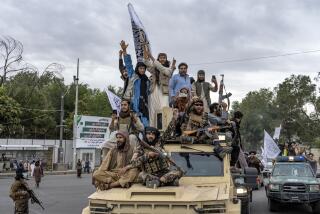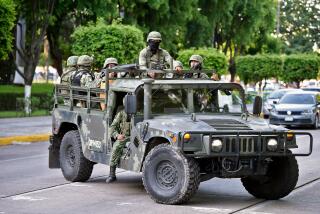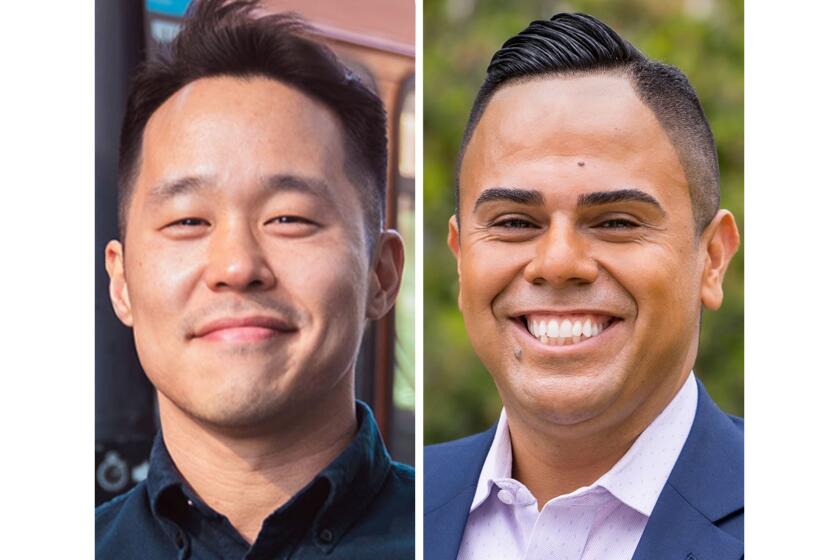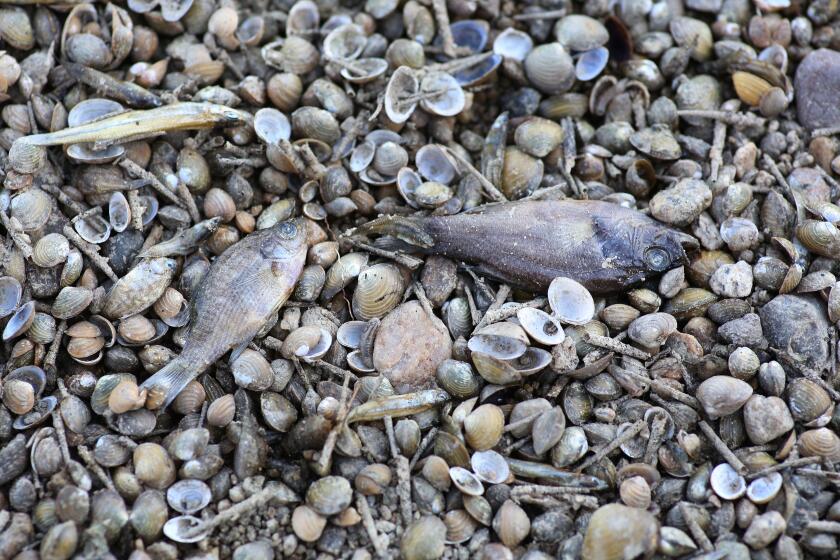The Lure of Opium Wealth Is a Potent Force in Afghanistan
Kunduz, Afghanistan
Like a frustrated hunter, the head of the local anti-drug squad keeps snapshots of the ones who got away.
One photo shows a prisoner wearing a flat, round pakol hat, standing in front of 10 pounds of opium packaged in plastic bags laid out on a table. Lt. Nyamatullah Nyamat took the picture on the February day he arrested the suspect. Hours later, the man was freed.
The stocky, plain-spoken cop glumly tossed another photo onto a desk in his basement office as if playing a losing hand of cards. In this one, a man in a white pillbox cap is handcuffed to a police officer and standing next to 62 pounds of opium. A local judge sentenced him to 10 years in prison. A higher court ordered his release.
One of Nyamat’s biggest catches, arrested with 114 pounds of heroin, a derivative of opium, hadn’t even appeared in court when the local prosecutor let him go in late March.
Nyamat said that was normal in Kunduz, a hub on one of the world’s busiest drug-smuggling routes.
Three and a half years after the United States led an invasion of Afghanistan to oust the Taliban regime, the United Nations and the U.S. government warn that the country is in danger of becoming a narco-state controlled by traffickers. The State Department recently called the Afghan drug trade “an enormous threat to world stability.” The United Nations estimates that Afghanistan produces 87% of the world’s opium.
For decades, poor farmers trying to make a living in Afghanistan’s mountain valleys have harvested the opium poppies that feed the world’s drug pipeline. Now the trade is booming, partly the result of the U.S. strategy for overthrowing the Taliban and stabilizing the country after two decades of war.
U.S. troops forged alliances with warlords, who provided ground forces in the battle against the Taliban. Some of those allies are suspected of being among Afghanistan’s biggest drug traffickers, controlling networks that include producers, criminal gangs and even members of the counter-narcotics police force. They are willing to make deals with remnants of the Taliban if the price is right.
The U.S.-backed Afghan president, Hamid Karzai, has brought some of those warlords into his popularly elected government, a recognition of their political clout and a calculated risk that keeping them close might make it easier to control them.
“Drug money is absolutely supporting terrorist groups,” said Alexandre Schmidt, deputy head of the U.N. Office on Drugs and Crime in Afghanistan. And regardless of their allegiance, Schmidt said, most suspects are released within 48 hours because of intervention by higher authorities.
Kunduz, in northeastern Afghanistan, is one of the front lines in what Karzai calls a holy war on drugs. It is just a 90-minute drive from the border with Tajikistan, where low-grade smack starts the next leg of its journey to the streets of Europe.
Nyamat says that as fast as he and his men can catch the smugglers, corrupt officials spring them. Many others are untouchable because they have important friends.
Nyamat carries a handwritten list, four neatly folded pages, to record his losing score. Reading it recently, he shook his head in disgust. Only three of 17 suspects arrested this year were still in prison.
“We have the complete ID list of all smugglers but we cannot arrest them because they have the power now, not us,” he said.
The list of those suspected of involvement in the drug trade reaches high into Karzai’s government.
Nyamat and an Afghan trafficker singled out Gen. Mohammed Daoud, a former warlord who is Afghanistan’s deputy interior minister in charge of the anti-drug effort.
An official of a human rights commission in eastern Afghanistan said police in Nangarhar province routinely ignored drug traffickers and other well-connected criminals, even though they took a strict stand against poppy growing. The provincial police are under the command of Hazrat Ali, a warlord who provided the bulk of the Afghan ground force that aided U.S. soldiers in the attempt to capture Osama bin Laden at Tora Bora in late 2001.
Daoud and Ali deny the charges.
U.S. allies are not the only ones reaping the drug bonanza. Taliban guerrillas also have a share in the opium and heroin trade, which the United Nations estimates is worth $3 billion a year. Warlords who once fought them collect a tax on drug shipments heading to Iran, Pakistan or Tajikistan. As long as the Taliban pay cash, they are pleased to let bygones be bygones, said police and two drug traffickers who claimed to have done business with the militants.
Some drug barons have changed their ways because they have already made millions of dollars and now see their self-interest in reform and politics, said a senior Western official involved in the anti-drug effort.
“Others are still involved in drug trafficking and today are part — at the highest level — of government,” said the official, who spoke on condition of anonymity. “The idea is not to leave them in the provinces anymore, but to bring them on board in official positions in order to better control them.”
But the official said he doubted the strategy would work.
Still, the U.N. and the Afghan government predict that this year’s opium harvest will be at least 30% smaller than last year’s 4,200 tons, partly because of a more aggressive eradication effort. The law of supply and demand has helped too. A glut has driven down prices and profits. But the smaller harvest is expected to push prices back up and encourage more planting and trafficking.
It is crucial for the Afghan government and foreign donors to deliver hundreds of millions of dollars in aid to farmers before the next planting season this year to make it unnecessary for them to grow opium poppies, said Schmidt, the U.N. official. Sufficient money has been pledged, but some governments have failed to make good on their promises, he said. And continuing insecurity in large parts of the country makes development work difficult.
Schmidt said he was certain that the poppy crop this year would be smaller than last year’s. “But the question is 2006.”
More than 2,000 years ago, much of Kunduz was a swamp. Alexander the Great stopped here for fresh horses as he pressed south in 329 BC in his conquest of much of the known world.
Today it’s a dust-blown smugglers’ paradise.
As they have for generations, horses decorated with small pompoms and bells clip-clop through the city, pulling carts that are used as taxis. The police chief of Kunduz province, former militia commander Gen. Mutaleb Baig, is also a throwback to the old Afghanistan. Instead of a police uniform, he prefers a green quilted coat, which he drapes over his shoulders like a chieftain’s cloak.
In late 2001, U.S. Special Forces and Central Intelligence Agency operatives worked with the Northern Alliance rebel group to besiege thousands of Taliban soldiers in Kunduz. The fight to take the city helped form close ties between U.S. forces and warlord Daoud, who had been finance secretary to Ahmed Shah Massoud, the Northern Alliance leader who was assassinated two days before the Sept. 11 attacks.
Before the attacks and the U.S.-led invasion of Afghanistan, State Department officials had often cited Northern Alliance drug trafficking as one reason the U.S. should not publicly support the anti-Taliban militia.
But police and traffickers interviewed in Kunduz said Daoud did more than use narcotics to help fund the fight against the Taliban: He made drug smuggling a family business. They said he continued to profit from the opium and heroin trade even after Karzai brought him into the central government last August.
Nyamat, a former intelligence agent who has been on the police force for 25 years, accused Daoud’s brother, Haji Agha, of handling the family drug business for Daoud, and he said that when his men arrested small-scale smugglers, the deputy minister had them released.
Nyamat, whose almond-shaped eyes are reminiscent of Genghis Khan’s Mongols, who swept through Afghanistan in the 13th century, said four of his own officers moonlighted for drug traffickers. Even counting them, his unit is 15 officers short of full strength.
He got up from his desk in a basement office of the Kunduz police station, closed two small windows, and lowered his voice. He said he couldn’t trust anyone, least of all provincial chief Baig, a former deputy to Daoud.
Nyamat alleged that Baig’s officers had undermined his efforts by rationing gas and refusing to provide armed backup during drug raids. Baig has fired him four times. The commander of the anti-drug force in Kabul keeps reinstating him.
Nyamat said he had reported his suspicions several times to his superiors, and in November he approached American officials working with the counter-narcotics police in Kabul. When nothing resulted from the discussions, he sent a trusted deputy to the Afghan capital to complain again in late February.
Daoud denied involvement in the drug trade but said other senior government officials, police and militia commanders were guilty of it.
He said in an interview that he and his brother had never had anything to do with opium or heroin, and said no Northern Alliance commander had ever trafficked narcotics, because Massoud did not tolerate it. He accused enemies of spreading lies about him.
“If there is even one [drug] case that I’m involved in, I am ready to be punished,” Daoud said.
Western officials involved in the anti-drug effort said privately that Daoud was once a trafficker but that they now trusted him as a committed leader in the fight against narcotics.
“Gen. Daoud is absolutely a key element in the eradication effort,” said Schmidt, the U.N. official.
The United Nations estimates that Afghan opium, morphine and heroin feed the habits of 10 million addicts, or two-thirds of the world’s opiate abusers. Afghan narcotics kill about 10,000 people a year, it says. Europe is the most lucrative market.
Until last year, Afghanistan was known as an opium exporter, not a major heroin producer. But with the poppy boom, and post-Taliban instability, small heroin labs sprang up in hundreds of villages. Even if police find them, they are easily replaced.
One Kunduz trafficker, a man in his late 20s with a wool hat resting high on his head, said an average lab had 10 barrels, a pressing machine, cotton filters and acetic anhydride, an acid, to refine opium paste into heroin powder.
The trafficker estimated that there was enough opium stashed in village wells and other hiding places to keep labs and smugglers working for 10 to 15 years, even if poppy cultivation stopped entirely. Schmidt said that was probably an underestimation.
Early last year, Karzai set up the paramilitary Special Narcotics Force, which answers only to him and his interior minister. Officials refused to provide details on its size and capabilities.
The Interior Ministry says the force carried out 12 operations in three of the country’s 34 provinces last year, destroying 70 labs and 88 tons of opiates — about 2% of Afghanistan’s production.
In late February, Afghan forces and American advisors from the Drug Enforcement Administration delivered 1.5 tons of heroin, opium and hashish to the counter-narcotics police headquarters in Kabul. The drugs were seized from homes and shops during three months of raids in southern Helmand province, said Muhibullah Ludin, a senior official in the newly formed Counter-Narcotics Ministry.
“It wasn’t very well hidden because it’s so common there,” he said. “Right now they’re trying to make it a bit more secret because so many people are being detained.”
In the lobby of the police station, officers laid out a long row of burlap and plastic sacks, several stained with gooey black opium gum, and weighed each sack on a freight scale in the corner. They also spilled out individual plastic bags packed with almost pure heroin, an off-white powder that looks like flour, to count them on the floor. There were 559 1-kilo bags — more than 1,200 pounds.
It seemed an impressive haul, but DEA advisors watched the count skeptically.
“Trying to get rid of drugs in Afghanistan is like trying to clear sand from a beach with a bucket,” said an American counter-narcotics agent.
The three-month operation resulted in charges against only one trafficker, Ludin said. A Western diplomat involved in the effort said that the special force had not gone after the people behind the drug networks yet because the justice system was too weak.
“We find it difficult to get any successful prosecutions of any significant traffickers, basically because people pay bribes,” said the official, who spoke on condition of anonymity.
With foreign assistance, the Afghan government is setting up special courts to try traffickers, with added security to protect investigators, prosecutors and judges. They will start with low-level cases and gradually move up the drug trafficking chain as they gain confidence, the Western official said.
Judges are easily bribed because they earn only about $100 a month, Schmidt said.
“We’ll be monitoring it very, very carefully in order to respond to any problems in the prosecution of these cases,” he said. “But I cannot tell you today that everything will be utterly beautiful and perfect.”
The Kunduz trafficker said he wasn’t worried.
He counts Daoud as one of his connections. Late in the summer of 2003, he said, Daoud helped him retrieve heroin worth $200,000 that had been seized at the Salang Tunnel, a link between southern and northern Afghanistan that is 11,000 feet up in the Hindu Kush mountains. Daoud denied this, saying drugs were never seized at the tunnel and that the trafficker was lying.
The trafficker also said he had sold a large consignment of heroin last year that had yet to be smuggled into Iran from the southwestern province of Nimruz. Premium Afghan heroin going to the West through Iran fetches a higher price and is less likely to be seized.
He predicted that the government crackdown would be good for business. Increased arrests and interdiction would cut competition and reduce the glut that forced down prices by two-thirds last year.
“The more restrictions, the more the business will boom,” the trafficker said. “The price will go high, the number of dealers will go down, and my income will go up. The professional businessmen will remain. They have good connections. Whoever works hard in a business wins.”
No matter where Afghan narcotics are headed, most of them pass through Kabul, a transit point on the main route linking poppy fields and labs in east and north to border smuggling routes.
Each day, from 8 a.m. to 4 p.m., police set up checkpoints on the edge of the capital. They ask drivers the “Seven Golden Questions,” taught by British advisors, which include where are they coming from, where are they going and who owns the vehicle. They try to form a hunch about whether they should conduct a search.
A sniffer dog named Warsola, a German shepherd trained in Kazakhstan to take commands in Pashto, stands by in a cage, eager to root out hidden drugs. The police also have a camera probe, a long black hose with a tiny lens on the tip, which allows them to peer into gas tanks and radiators.
But at the end of the day, the outmatched police, paid $60 a month, lock up their weapons, go home and wait for death threats. They worry about their families.
“When I leave my house I tell my children, ‘Please don’t go out.’ And I tell them, ‘If you need anything, please tell me. I will bring it to you,’ ” Mohammed Nazir said. “We are afraid.
“Even if a cat jumps into my house, I get scared and I think that there is somebody in the house to kill me.”
Nazir’s 13-member team has arrested more than 30 suspected drug traffickers since it started work nine months ago. The team’s first bust was of uniformed police officers armed with hand grenades and guns. They were caught with 24 pounds of opium in a knapsack in a civilian car. They said they had no idea that the drugs were there, Nazir said.
One of the unit’s most dangerous arrests was last summer, when it discovered more than 400 pounds of opium concealed in the cabin of a gas tanker coming from northern Afghanistan. The smuggler had tried to mask the musky opium smell with piles of melons.
When police confronted the driver, he used his cellphone to call for help. Then he offered a bribe, and when that didn’t work, he invoked the name of Gen. Haji Mohammed Almas, a Northern Alliance warlord, whose forces are suspected in many robberies and killings in the capital.
On the way to jail with their suspects, the police noticed that they were being followed by two SUVs full of gunmen. They kept their distance when the drug squad officers pulled into the jail, said Shamsuddin, a member of Nazir’s unit. Like many Afghans, he uses only one name.
That night, about 1 a.m., a phone call woke him. Lying next to his wife, Shamsuddin began sweating in anger as a voice on the phone threatened him, he recalled.
“I was sweating just because he wasn’t next to me,” the cop snarled. “Otherwise I would have beaten him to death.”
A few days later, when Shamsuddin was sitting with other officers at the drug squad’s headquarters, the same man called and repeated the threat.
Nazir said traffickers had no trouble finding phone numbers to harangue counter-narcotics police at any hour. “All of these people have friends inside the government,” he said.
A week after their arrest, the truck driver and his assistant walked free and drove off in their tanker.
Almas, the warlord, denied that he trafficked in drugs and declared that the police were hopelessly corrupt.
“In reality, the police are very sleepy in Kabul,” he said. “And that is because all the thieves and criminals have joined the National Police. Whenever they commit a crime they name a [militia] commander and say that his men did this.”
Like many in the front-line drug squad, Shamsuddin, a 23-year police veteran, is angry that warlords with a long record of crimes and abuses in the country’s wars have been promoted to top police positions, putting uniformed officers at their mercy.
“I can only trust these 12 people in my team,” he said. “Our government is not a real government. I pray and hope for a day that we have a foreigner as a boss, and he is standing over our heads and controlling us. There is no management in our government and there is no authority from the Afghans.”
East of Kabul, in one of Afghanistan’s oldest opium-producing regions, Karzai has tried to resolve the police-warlord conflict by melding the two in the person of Hazrat Ali.
Western officials praise the Nangarhar police chief for his strict stand against poppy growing. Cultivation has been cut drastically in a region where spring usually brings fields full of red and white opium poppy flowers.
But Jandad Spin Ghar, who leads the eastern regional office of the Afghanistan Independent Human Rights Commission, said Ali’s police routinely arrested innocent people and committed other serious abuses while letting drug traffickers and other well-connected criminals go free.
“He only stopped the cultivation and he has done nothing to stop the trafficking,” Spin Ghar said. “I don’t understand why the U.S. and the central government are supporting him.”
Daoud, the deputy interior minister, said he had summoned Ali to Kabul to answer such allegations, and was satisfied that they were false. Ali accused enemies of spreading lies about him.
“I told him, ‘Look, General, I have never been in the drug business my whole life,’ ” Ali recalled. “I hate drugs more than anything else and neither I nor my men are involved in the drug business.”
Part of the solution to Afghanistan’s drug problem may lie in the soft petals and sweet scent of the Bulgarian rose. A German aid group has persuaded a dozen farmers in one Nangarhar village to grow them to see whether they can provide the essence for fine French perfumes.
Janaan Khan, a village leader in Dara-e-Noor, planted 150 rose seedlings on half an acre. They poke just a few inches out of the wet soil, which once provided bumper harvests of premium red opium. He earned about $4,000 from his last poppy crop in 2002, a fortune in a country where per capita income in 2003 was about $200, putting it among the bottom 20 nations.
It’s more difficult to produce high-quality rose oil than high-grade opium, and German experts told Khan that it would take three years to find out what, if anything, their Bulgarian roses were worth.
A stiff wind can bruise the blossoms, rendering them worthless. At harvest time, farmers have just one day to gently pluck the flowers and process them into rose oil, Khan said. At most, he expects to earn a quarter of what he did from opium. But he says that would be enough for an honest living.
“I told the farmers that if this thing succeeds, then Afghanistan will be famous for flowers and perfumes, not for war and opium, and Dara-e-Noor will be as famous as Paris,” Khan said, his eyes lighting up with the dream.
“I told them that these flowers will have great smell and foreigners will come from all over the world for a picnic. And they will enjoy being here. And everywhere you look there will be foreigners, and we will build guesthouses and take money from the foreigners who stay here. And we will all be rich.”
Despite his outward confidence, Khan acknowledged that he was worried he might be wrong. The German aid group has promised a small cash subsidy to tide the farmers over, but Khan said it was far less than the thousands of dollars they were used to earning. They probably will wait only a year or two before they start growing opium poppies again, he said.
It’s easy to see why. The village doesn’t have electricity, running water or a proper school. The only road is a dirt track dotted with sharp rocks. There are too many people living on too little land; most of the farmers are sharecroppers who rent small parcels from a few wealthy landlords.
“Name a problem and these people have it,” said Khan, who supports two wives and four children. “Our lives have not moved forward. They have gone backward because no matter how much aid money they have spent, we don’t have any money now.”
In villages across Afghanistan, powerless people such as Khan say they want to be rid of the warlords once and for all, and they wonder why Karzai is giving them more power.
“Democracy means freedom and people’s government,” he said. “But in Afghanistan, if you tell a [militia] commander, ‘You have made these mistakes. Please quit your job,’ the commander will take out a gun and kill you.”
Khan’s neighbor Sayyed Alam Khan lost his 6-month-old daughter, Najeda, in late February. Like many of the area’s children, she lived with her family in a mud-brick house with a leaky ceiling that dripped cold water day and night. A simple cold proved fatal. Six feet of snow closed off the valley, so Khan couldn’t get her to the nearest hospital in Jalalabad.
She wasn’t the first of Khan’s children to die. He has lost two other daughters and a son. And he has seven children left, ages 2 to 13. They huddled next to him in the smoky half-light beside a cooking fire, trying to keep warm on a cold dirt floor.
Three years ago, after his oldest son died at age 6, Khan borrowed about $5,000 from relatives. He planned to pay it back with the profit from the next year’s opium harvest. But when their poppies were nearly ready, police came and ordered Khan and other villagers to destroy the plants. They were paid $5 for a day’s work that wiped out their livelihood, and any hope Khan had of paying his creditors.
He has no interest in planting roses. “I will die by the time the flowers bloom,” said Khan, 61. He is trying to support his family by selling firewood, but he is not earning enough to keep his creditors at bay. According to local custom, they can soon claim his eldest daughter as compensation.
*
(BEGIN TEXT OF INFOBOX)
A growing problem
Except during a Taliban crackdown on growers, Afghanistan’s opium production has generally trended upward, no matter who was running the country.
*
Politics and illicit drugs
- Soviet era: Military occupies Afghanistan for a decade; mujahedin launch a guerrilla war for independence.
- Civil war: Various militias led by competing mujahedin warlords struggle for control after Soviets withdraw.
- Taliban rule: Taliban imposes strict Islamic law after seizing control in 1996, bans opium poppy cultivation in July 2000.
- U.S. invasion and postwar: U.S. drives Taliban from power in late 2001; transitional government emerges.
*
Opium production, in metric tons (one metric ton is equal to 1.1 U.S. tons)
1980: 200
1994: 3,400
1999: 4,600
2001: 200
2004: 4,200
*
The economic incentive
Despite a drop in 2004 in the income a farmer could expect from a hectare of poppies, the amount in U.S. dollars is still 12 times what a hectare of wheat would produce. (One hectare is equal to 2.47 acres.)
-
Income per hectare
2003
Wheat: $470
Poppies: $12,700
2004
Wheat: $390
Poppies: $4,600
-
Hectares under cultivation
2003
Wheat: 2.3 million
Poppies: 80,000
2004
Wheat: 1.8 million
Poppies: 131,000
*
Source: United Nations Office on Drugs and Crime
Graphics reporting by Tom Reinken
*
(BEGIN TEXT OF INFOBOX)
Routes out
Opium and its derivatives, such as heroin, are smuggled out of Afghanistan in many directions and mostly overland. The bulk moves west or southwest into Iran. Smaller, roughly equal amounts move through Tajikistan and Pakistan.
To the U.S.: To reach New York City, the center of U.S. distribution, Afghan opiates are often moved into Pakistan and ultimately through Africa.
To Europe: Opium moves directly into Iran or Pakistan and then through the Balkans to Europe.
To Russia: Political instability and economic problems in Central Asia make this a common route to Europe.
Sources: Jane’s Intelligence Review; U.S. State Department; United Nations Office of Drugs and Crime; https://www.pbs.org .
Graphics reporting by Tom Reinken
More to Read
Sign up for Essential California
The most important California stories and recommendations in your inbox every morning.
You may occasionally receive promotional content from the Los Angeles Times.










